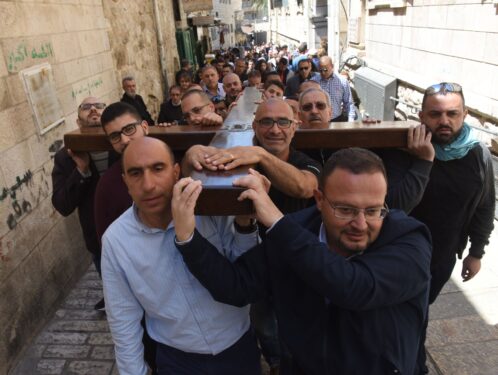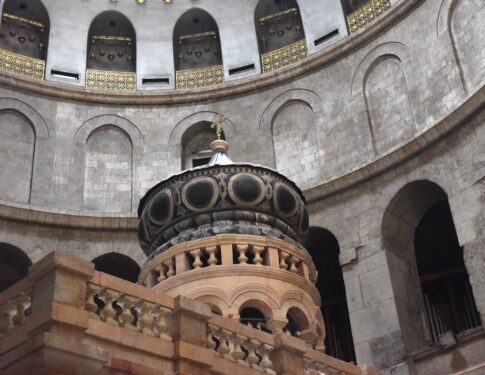
PROSPECT PARK — Bishops worldwide urge Catholics to boost their generosity this year for the annual Pontifical Good Friday Collection for the Holy Land.
The annual collection helps support the upkeep and maintenance of the Holy Places of pilgrimage where Jesus Christ walked. It also sends aid to Christians in the Middle East, paying for pastoral, charitable, and educational works.
The collection this year, April 2, has much catching up to do because 12 months ago the pandemic kept Catholics from attending Good Friday services.
“It is one of the biggest collections we have, believe it or not, because many people go to church on Good Friday,” said Bishop Nicholas DiMarzio of the Diocese of Brooklyn. “They pass the basket, and people put something in it.”
Money collected at a Good Friday service is solely for the Holy Land fund, but last year, “Nobody was in the pews,” according to Bishop DiMarzio.
Pope Francis’ trip to Iraq drew attention to the plights of Christians in the Middle East. The pandemic worsened these conditions, according to Cardinal Leonardo Sandri, prefect of the Congregation for the Oriental Churches.
Therefore, Cardinal Sandri wrote a letter to bishops reminding them about the annual collection. The cardinal said this money is critical to effectively help Christians in the Middle East who seek “to be the salt, light, and leaven of the Gospel.”
Specifically, the funds support projects in the Holy Land, Cyprus, Syria, Lebanon, Egypt, Ethiopia, Eritrea, Turkey, Iran, and Iraq.
According to an earlier report, the proceeds so far have supported 23 parishes and three academic institutions. The money has made 400 scholarships for high school and university students and helped keep schools open for more than 10,000 kids, pre-K through high school.
Also, the money has maintained more than 1,000 homes for Christian families, created 1,200 jobs for Christian workers, and preserved 65 shrines devoted to Jesus and the prophets.
As prefect, Cardinal Sandri directs the Congregation for Eastern Churches in overseeing the Good Friday collection. Also working on that task are the Franciscans of the Custody of the Holy Land.
According to a statement from the Franciscans, “It is vital that we support Christians living in the Holy Land, in order to maintain a Christian presence in the very land made holy by the life, death, and Resurrection of Jesus.”
But In 2020, Christians in the Middle East suffered “the loss of work, due to the absence of pilgrims, and the consequent difficulty in living with dignity and providing for their families and children,” the Cardinal Sandri wrote.
“In many countries,” he added, “the persistence of war and sanctions compounded the effects of the pandemic.”
But, Cardinal Sandri also noted that the annual collection for the Holy Land “fell short.”
Since churches were closed in 2020 during Holy Week, Pope Francis postponed the Good Friday collection until September.

In Brooklyn and Queens, parishioners raised $81,903, which was 67 percent less than the $243,124 raised by the diocese in 2019, said Father Patrick J. Keating, who oversees collections for the Diocese of Brooklyn.
Father Keating said that the annual fundraiser usually nets between $240,000 and $280,000 each year in the diocese.
“That’s why we’d like to remind people,” Bishop DiMarzio said of this year’s effort. “Really, they’re hurting over there. But this helps people, and also the holy places, to help maintain them. That’s why it’s so important.”
The Good Friday collection this year is expected to improve since churches are now open for partial attendance, the bishop said. But, he noted, fewer people in the pews still is “problematic.”
Bishop DiMarzio and Father Keating stressed that people can still participate in the collection, even if they can’t attend Good Friday services.
Donations can be made during a service by placing them in envelopes and marking that the funds are designated for the Good Friday collection.
Father Keating said people can mail their donations to their parish offices, but send checks, not cash, and note on the document that the money is for the Good Friday Collection for the Holy Land.
